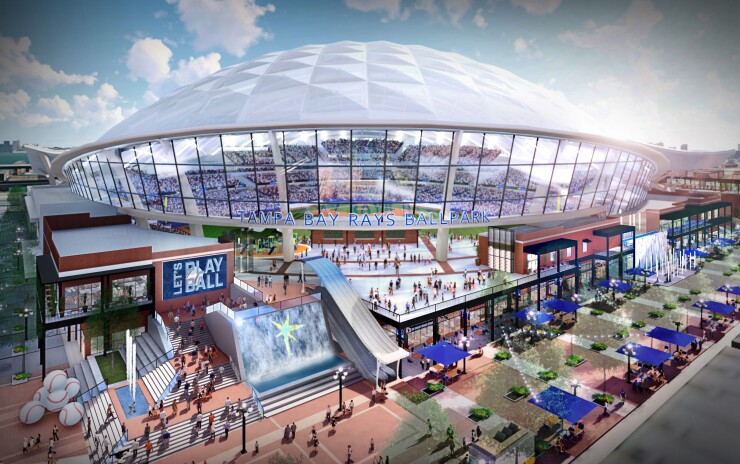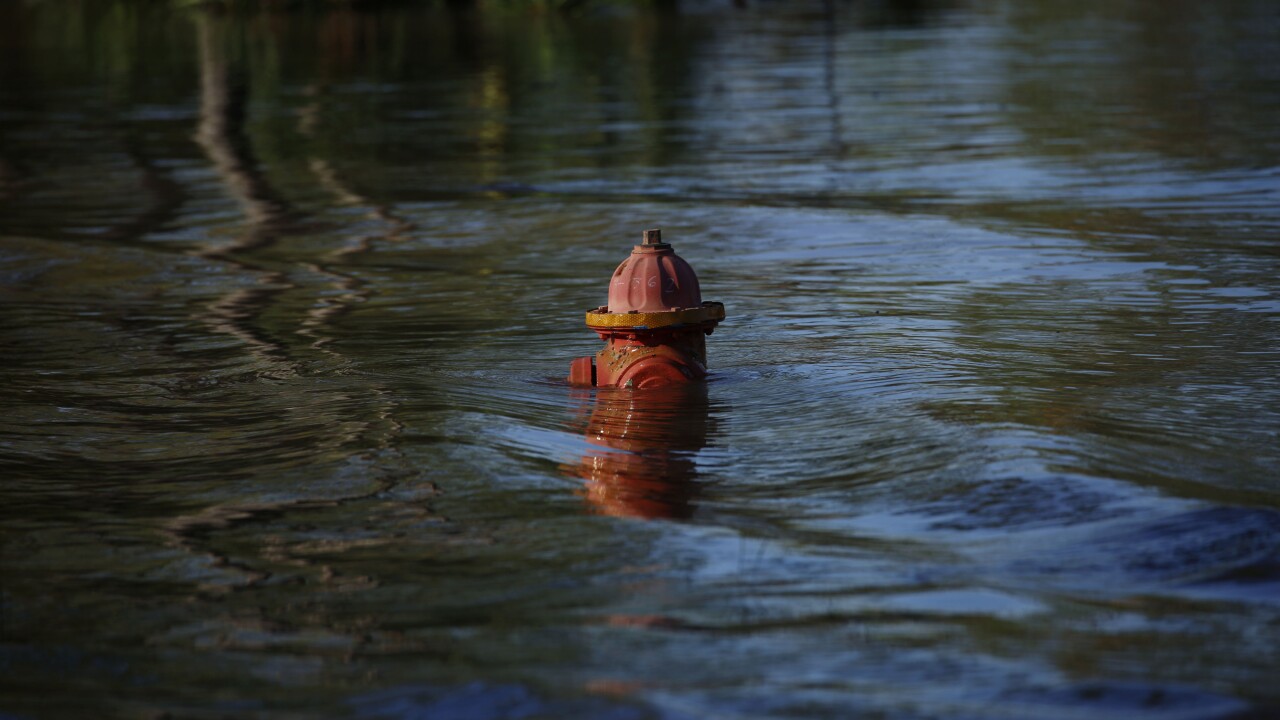The Tampa Bay Rays say the baseball team's deal for a new stadium near downtown Tampa is dead.
The Rays abruptly rejected the framework for funding a new $900 million ballpark in Tampa's Ybor City neighborhood near downtown, saying that financing and other details weren’t thorough enough with the clock running out on the deadline to make a decision.

The Rays, which had a three-year agreement with St. Petersburg to search for a new Major League Baseball park in the Tampa Bay region, notified the city Dec. 17 that the team will continue to play at the city’s domed Tropicana Field.
The search deadline expired Dec. 31.
The framework for a Tampa deal, outlined by Hillsborough County Administrator Mike Merrill in early December, required the Rays to pay half of the cost of acquiring the land and building the stadium and to pay for cost overruns.
The Rays had suggested a willingness to contribute $150 million or more to the project but never committed to an amount publicly.
Merrill said his mandate was to come up with a deal in which no public funds would be committed from the county or the city of Tampa. Under his proposal, half of the cost would come from landowners, businesses and private investors. Very little of the project would have been financed with bonds.
The Rays said they won't negotiate further.
“While the momentum and progress [on a deal] are real, we’re not close at all to a workable framework,” Rays principal owner Stuart Sternberg said Dec. 11, while attending baseball’s winter meetings in Las Vegas.
Sternberg said fundamental issues weren’t adequately addressed in Merrill’s proposal, including the cost and timing for building a stadium, who would have site control, political approvals for a deal, and private investment commitments.
Merrill told county commissioners in early December that his outline for a deal was unique because the county’s half of the project’s cost would come from businesses, landowners and private investors — not public funds.
“We had a steep climb to make this a private deal,” he said, adding that other teams have obtained public subsidies.
The city of Miami and Miami-Dade County financed about 70% of the Miami Marlins stadium costs and a variety of public funding sources are paying for about half the cost of the new Texas Rangers’ ballpark, Merrill said.
The $1.1 billion Rangers’ Globe Life Field is under construction in Arlington, Texas.
Marlins Park, a retractable-roof stadium built on public land, cost more than $645 million and opened in March 2012. The contentious deal cost several politicians their jobs when angry voters recalled them in special elections.
“We believe we have done the best that we can to fulfill the charge we had, which is come back with a deal that doesn't involve any new public money,” Merrill said. “That was a tall order and very challenging.”
The public’s half of the Rays stadium funding was to come from tax increment revenue from two existing community redevelopment agencies in Ybor; assessments on landowners or businesses using a community development district; and investors through a federally designated Opportunity Zone in Ybor City.
Opportunity Zones, created in the Tax Cuts and Jobs Act of 2017, allow investors to put cash into projects and defer paying capital gains taxes. The investments would be paid back with revenues generated from development around the new ballpark.
To minimize the use of borrowing, Merrill said he expected only revenue from the CRA would be used to issue bonds for the stadium.
He told commissioners he couldn’t say how much bonding was expected because no determination had been made about how much revenue would come from each of the three sources of payment.
“This is a deal that's never been done before, ever, by a stadium and so we're laying off the cost and the risk to the private sector across the board,” he said.
And now it’s a deal that won’t be done at all.
The Rays, who finished the 2018 season 90-72, announced in February they’d selected Ybor City as the location for a new stadium. It’s about 24 miles northeast of Tropicana Field in St. Petersburg.
Two prominent local businessmen involved in negotiations to lure the Rays to Tampa, Chuck Sykes, chief executive officer of Sykes Enterprises, and Ron Christaldi, a partner at Shumaker, Loop & Kendrick LLP, formed the nonprofit SC Hillsborough Corp. to purchase options on 14 acres of property in Ybor City.
How much the land was expected to cost and whether it was included in the stadium’s cost wasn’t made public and Merrill’s office couldn’t be reached for comment.
Sykes and Christaldi also formed a privately funded nonprofit organization to launch the Tampa Bay Rays 2020, a movement to bring the team to Ybor City that included a website where supporters could sign a petition. They also helped find businesses to buy season tickets.
In July, the Rays unveiled renderings for the project.
Calling it the “most intimate ballpark in MLB,” the Rays said the 28,216-seat facility would have had a total capacity of 30,842.
The stadium was to be fully enclosed with a translucent roof for “fan comfort and game certainty,” and with sliding glass exterior walls that would open to the outside.
It was estimated to cost $892 million and open in 2023.
“We spent thousands of hours and many millions of dollars to make our vision of an Ybor ballpark a reality,” Sternberg said when he announced that the deal wouldn’t come to fruition.
He said the agreement between the team and city of St. Petersburg allowed the Rays “a very generous three-year window” to explore ballpark sites throughout the Tampa Bay region.

“It was a very important step in our longstanding pursuit of a new home for the Rays, something we’ve been trying to do for 10 years,” he said. “Unfortunately, that window is closing without us achieving that goal.”
Sternberg thanked elected officials, businesses and community leaders who participated in the site search. The team expects to play at Tropicana Field though the end of its agreement with St. Petersburg in 2027.
“While I am wildly disappointed by the result, I’m not discouraged,” he said. “I’m firmly committed to helping the Rays remain and thrive in Tampa Bay for decades and generations to come.”
The team’s owners sought a new stadium to boost revenue and because attendance at the downtown St. Petersburg ballpark has been routinely dismal, finishing 30th out of 30 major league teams from 2012 to 2017.
For the 2018 season, the Rays had the second-lowest home attendance for the MLB regular season with an average of 14,259 fans per game. The Miami Marlins finished last in home attendance with an average of 10,014.





